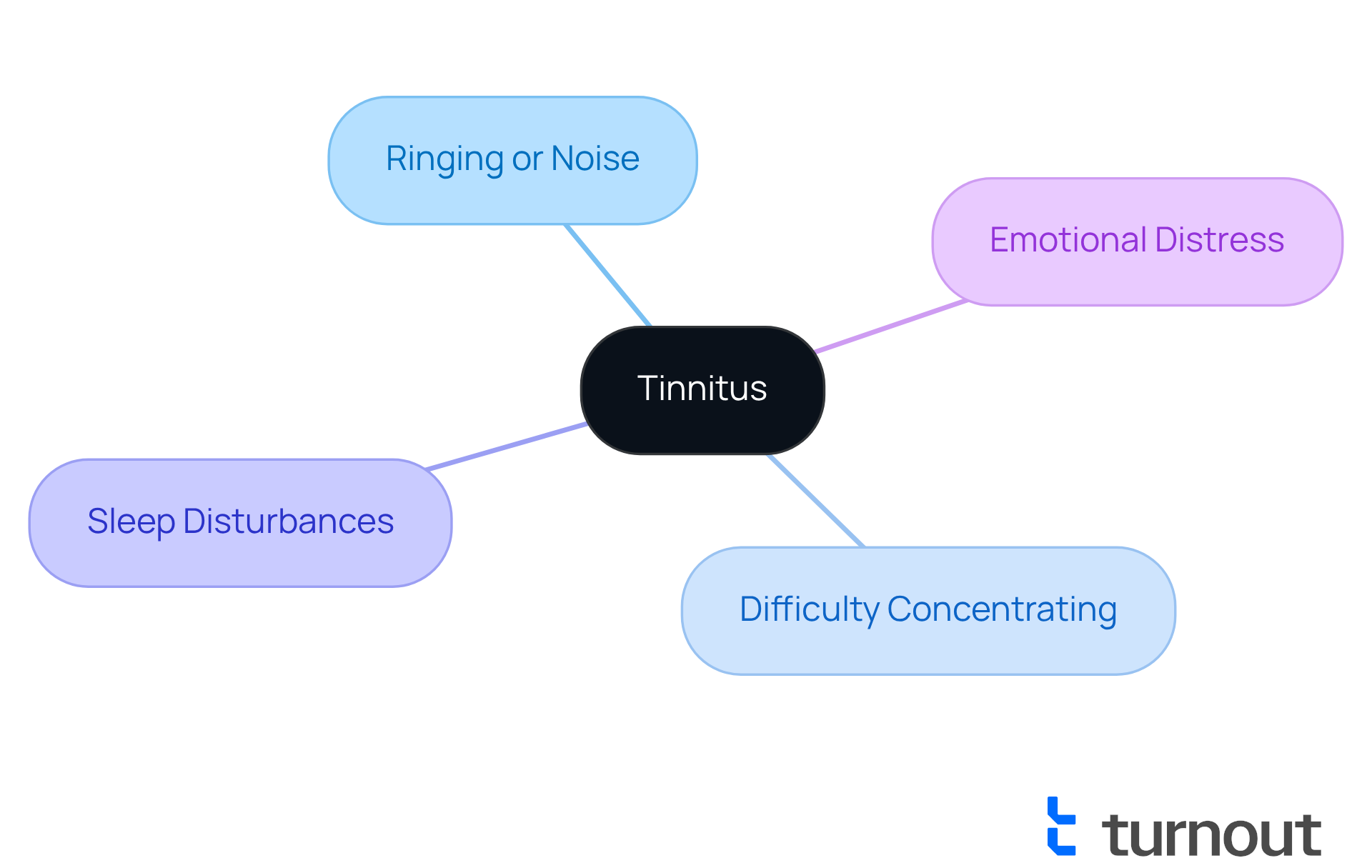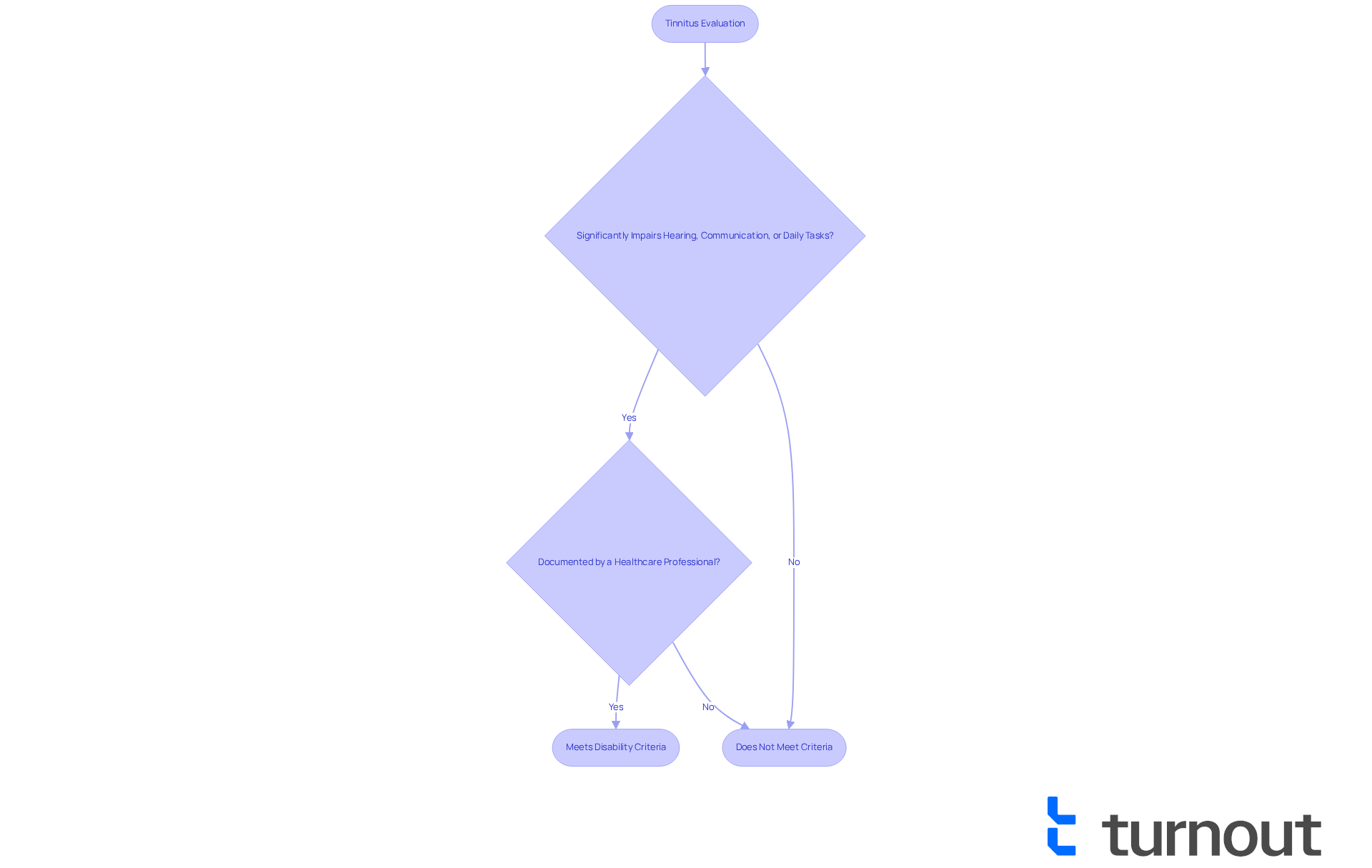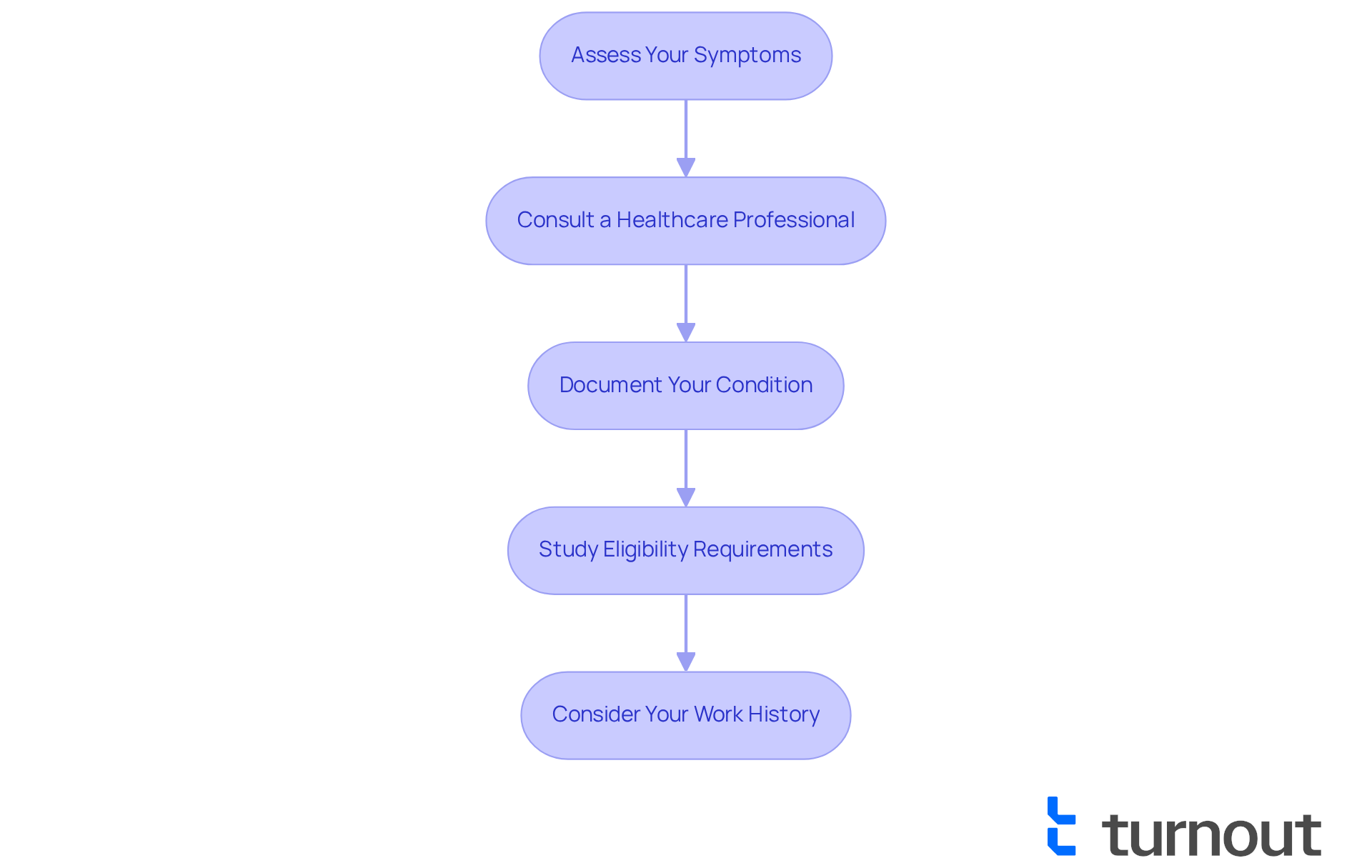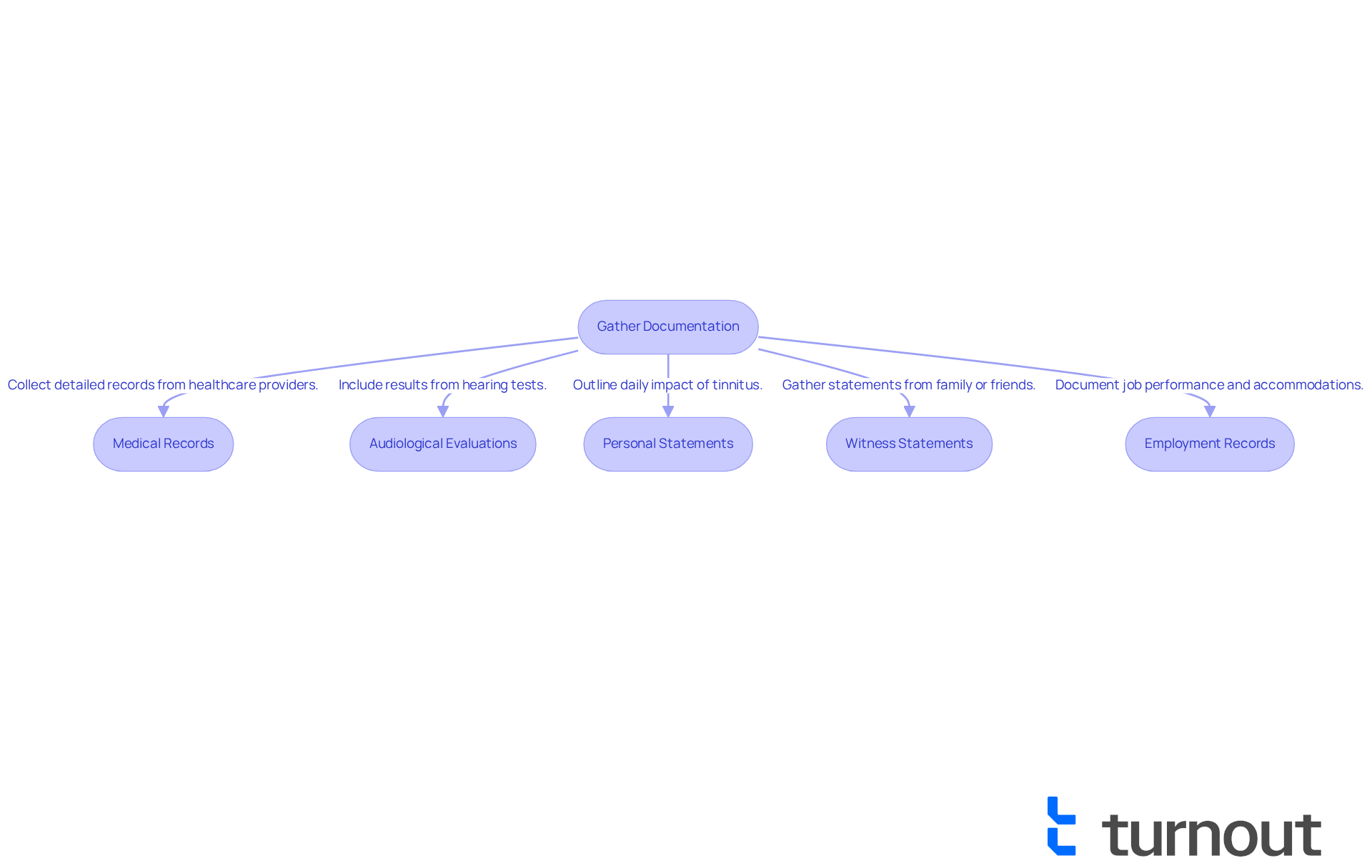Overview
Tinnitus can be a challenging condition, and for some, it may be considered a disability if it significantly impairs essential life activities. This aligns with legal standards such as the Americans with Disabilities Act (ADA). We understand how overwhelming this can feel, but there are steps you can take to determine your eligibility.
- Start by assessing your symptoms and consulting healthcare professionals who can provide guidance tailored to your situation.
- Documenting your condition is crucial, as it supports your case.
- Additionally, familiarize yourself with the requirements set by the Social Security Administration.
Together, these steps can help evaluate tinnitus as a potential disability.
Remember, you are not alone in this journey. We're here to help you navigate through these challenges and find the support you need.
Introduction
Tinnitus, often characterized by persistent ringing or buzzing in the ears, can significantly disrupt daily life. We understand that this condition may lead individuals to question its status as a disability. Understanding the nuances of tinnitus is essential, as it may qualify for legal recognition under the Americans with Disabilities Act if it severely limits essential activities.
However, navigating the complexities of eligibility and documentation can be daunting. What steps must one take to determine if tinnitus qualifies as a disability? This guide will explore the critical factors and processes involved in assessing tinnitus as a disability, empowering you to seek the support you deserve. You are not alone in this journey.
Understand Tinnitus: Definition and Symptoms
Tinnitus is often described as a ringing, buzzing, or hissing sound in the ears, and it’s important to know that this experience is not caused by an external source. It can be constant or intermittent, and its intensity can vary greatly. Many people face common symptoms, including:
- Persistent ringing or noise in one or both ears.
- Difficulty concentrating or focusing due to the noise.
- Sleep disturbances caused by the sounds.
- Emotional distress, such as anxiety or depression, stemming from the condition.
We understand that identifying these signs is the first step in comprehending how ringing in the ears raises the question, , and how it can and work abilities. This understanding is crucial for for support. Remember, you are not alone in this journey, and find the assistance you need.

Explore Legal Recognition: Tinnitus as a Disability Under the Law
According to the Americans with Disabilities Act (ADA), if ringing in the ears one or more , it leads to the consideration of whether . We understand that this can be a challenging experience, and it’s important to know what qualifies as a condition. To meet the criteria, the condition must:
- Significantly impair your ability to hear, communicate, or perform daily tasks.
- Be documented by a .
It's essential to recognize that not every instance of ringing in the ears will meet these criteria. The seriousness of your situation and its impact on your daily life will be important factors in determining if tinnitus is a disability. Remember, you are not alone in this journey, and we’re here to help you .

Assess Eligibility: Steps to Determine Disability Qualification for Tinnitus
To determine your eligibility for due to tinnitus, follow these essential steps:
- Assess Your Symptoms: We understand that ringing in the ears can significantly , including your ability to work, socialize, and maintain your mental health. Millions of Americans experience this challenge, and reflecting on its impact on your life is crucial.
- : It’s important to schedule an appointment with an audiologist or ENT specialist to discuss your symptoms. In 2023, only 36.8 percent of adults with troublesome ear ringing sought assistance from a healthcare provider, falling short of the target of 45.6 percent. Remember, early intervention can lead to better management of your condition.
- : Keep a comprehensive record of your symptoms, noting their frequency and how they disrupt your daily activities. This documentation is vital for substantiating your claims and can be a powerful tool in your journey.
- Study Eligibility Requirements: Familiarize yourself with the specific standards for benefits related to ringing in the ears as outlined by the . The Listing of Impairments provides medical criteria sufficient to establish disability and can help answer the question of whether in your application process.
- Consider Your Work History: Reflect on how this condition has impacted your ability to fulfill job responsibilities or maintain employment. The SSA assesses the consistency of statements regarding your , so be prepared to discuss how your symptoms have influenced your work life.
By following these steps, you can associated with hearing issues more effectively. Remember, you are not alone in this journey. to assist you in understanding these processes and ensuring that your claims are well-supported, all without the need for legal representation.

Gather Documentation: Proving Your Tinnitus Disability Claim
To enhance your for hearing-related issues, it is essential to gather thorough documentation that clearly describes how that impacts your daily life. We understand that this process can be overwhelming, but can significantly . Here are key elements to include:
- : It's crucial to secure detailed records from your healthcare providers that document your tinnitus diagnosis, treatment history, and any prescribed medications. This evidence is vital, as success with heavily depends on solid medical documentation to determine if tinnitus is a disability. In fact, over 2.9 million veterans have been service-connected for hearing-related conditions, highlighting the importance of thorough documentation in these claims.
- Audiological Evaluations: Incorporate results from hearing tests that demonstrate . These assessments are crucial for illustrating the seriousness of your situation and its effect on everyday functioning.
- s: Compose a personal statement that outlines how this condition affects your daily routine, work, and emotional health. This narrative helps the VA understand the personal difficulties you encounter because of your situation.
- Witness Statements: If feasible, collect remarks from relatives or acquaintances who can confirm the impact of the condition on your life. As noted by advocates, buddy statements can provide essential support for your claim by narrating the emergence of symptoms or pivotal service events related to the diagnosis.
- Employment Records: Gather documentation from your employer regarding your job performance and any accommodations made due to your condition. This information can illustrate how hearing issues have affected your professional environment.
Maintaining is essential in substantiating your assertion and illustrating the degree to which hearing issues impact your life. As highlighted by advocates for individuals with disabilities, effective record-keeping is crucial for successfully navigating the VA system, and comprehensive medical records can greatly improve your chances of approval. Remember, you are not alone in this journey. Additionally, consider the potential for secondary conditions related to tinnitus, as these can also impact the evaluation of whether tinnitus is a disability in your overall disability rating.

Conclusion
Understanding tinnitus and its potential classification as a disability is essential for those affected by this condition. We recognize that the journey to determine eligibility for support can be challenging. It's important to acknowledge the profound impact tinnitus can have on daily life, including work, social interactions, and mental health. By navigating the legal frameworks and eligibility criteria outlined in this guide, you can better assess your situation and seek the assistance you deserve.
Key insights covered include:
- The definition and symptoms of tinnitus
- The legal recognition of this condition under the Americans with Disabilities Act
- The necessary steps to evaluate eligibility for disability benefits
Emphasizing the importance of thorough documentation, including medical records and personal statements, highlights how these elements play a crucial role in substantiating your claims and improving your chances of receiving support.
Ultimately, understanding tinnitus as a potential disability extends beyond legal recognition; it underscores the importance of seeking help and advocating for yourself in the face of challenges. You are not alone in this journey. Those experiencing tinnitus should not hesitate to consult healthcare professionals and gather the necessary documentation to support their claims. Taking proactive steps can lead to better management of the condition and open doors to the resources and assistance vital for enhancing your quality of life.
Frequently Asked Questions
What is tinnitus?
Tinnitus is often described as a ringing, buzzing, or hissing sound in the ears that is not caused by an external source.
What are the common symptoms of tinnitus?
Common symptoms of tinnitus include persistent ringing or noise in one or both ears, difficulty concentrating or focusing due to the noise, sleep disturbances caused by the sounds, and emotional distress such as anxiety or depression.
Can tinnitus be constant or intermittent?
Yes, tinnitus can be either constant or intermittent, and its intensity can vary greatly.
How does tinnitus affect daily life and work abilities?
Tinnitus can impact daily life and work abilities by causing difficulty in concentration, sleep disturbances, and emotional distress, which may affect overall well-being and productivity.
Is tinnitus considered a disability?
Understanding the symptoms of tinnitus is crucial for assessing its impact on daily life and determining eligibility for support, which may include considering it as a disability.




